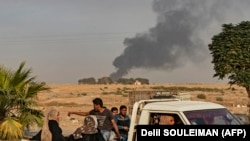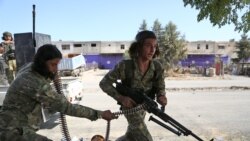On September 21, Turkish President Recep Tayyip Erdogan addressed the U.N.’s 76th General Assembly and boasted about his military actions along the border of war-ravaged Syria.
“As a result of our efforts and at the expense of our martyrs, we were able to ensure the voluntary return of 462,000 Syrians to the areas where we provided security.”
But that is misleading.
In fact, Turkey’s ongoing military actions in Kurdish-controlled areas in Syria have displaced thousands of locals and killed hundreds of civilians. Refugees from other parts of Syria are replacing inhabitants in majority Kurdish areas. Critics call it “demographic engineering.”
And Turkey recently accelerated military strikes in Kurdish-controlled border areas, including drone attacks targeting the Kurdish-led Women’s Protection Units, or YPJ.
The allied Kurdish People’s Protection Units (YPG) were the backbone of the Syrian Democratic Forces (SDF) formed in 2015 and backed by the U.S. to fight the Islamic State (IS) group in Syria. Ankara, however, regards the Kurdistan Workers Party (PKK) as a terrorist group and considers its push for independence tantamount to insurgency.
The United States-YPG alliance to defeat Islamic State has always infuriated Turkey, although the U.S. also has deemed the PKK a terror group.
The YPG is the military arm of the Democratic Union Party (PYD), an offshoot of the PKK in Syria. Turkey engaged in talks with PKK and PYD leaders until 2015, when the talks broke down. However, the SDF in Syria denies having connections to the PKK.
Humanitarian groups say Syria is in the midst of the world’s worst refugee crisis, with more than 13 million people displaced and most in need of food, water, shelter and other assistance. About half those affected are children, according to the aid group World Vision.
They Syrian civil war began in 2011. Since 2016, Turkey has conducted airstrikes and cross-border military operations in conjunction with allied Syrian militias. They targeted YPG-controlled areas in northern Syria and purportedly had the aim of establishing a safe zone cleared of IS and YPG fighters.
At the U.N., Erdogan called the U.S. relationship with the YPG “unacceptable.’ He claimed that the Turkish presence in Syria prevented PKK terrorists from using the territory to launch attacks.
But Turkey’s border operations have been disruptive and marred by accusations of atrocities.
In 2018, Turkey and allied Syrian rebels launched an operation in the Kurdish-controlled Syrian enclave of Afrin. At the time, 500,000 people were living in the area, 80 percent of them Kurdish, along with about 300,000 refugees of all ethnicities.
The Turkish campaign displaced an estimated 150,000-200,000 people from the area. Turkey allowed Syrian refugees from other areas to relocate to Afrin. Civilians who remained in Afrin were reportedly subject to arrest, torture, loss of property and cultural persecution, according to the Syrian Observatory for Human Rights, a UK-based war monitor.
In October 2019, Turkey launched another military operation in northeast Syria. The U.N. said about 180,000 civilians were forced to flee the area, and that the operation worsened the already dire humanitarian situation for 3 million people living there.
In 2019, Erdogan told the U.N. that 2-3 million Syrian refugees in Turkey would be resettled in this area. According to Refugees International, a Washington, D.C., advocacy group, this would violate international law as it would significantly alter the ethnic landscape in northern Syria and could be seen as demographic engineering.
Amnesty International said in 2019 that there was credible evidence Turkish forces and their Syrian allies had committed war crimes. “Turkish military forces and a coalition of Turkey-backed Syrian armed groups have displayed a shameful disregard for civilian life, carrying out serious violations and war crimes, including summary killings and unlawful attacks that have killed and injured civilians, during the offensive into northeast Syria,” the group said in a statement.
Human Rights Watch (HRW) also denounced Turkish forces and allied Syrian militias. “Contrary to Turkey’s narrative that their operation will establish a safe zone, the groups they are using to administer the territory are themselves committing abuses against civilians and discriminating on ethnic grounds,” the group said.
In October 2019, the U.S. imposed sanctions on Turkish officials and institutions. The White House said Turkey’s moves in Syria threatened to undermine the war against jihadists, endangered civilians and further threatened to “undermine the peace, security, and stability in the region.”
In September 2020, the United Nations Human Rights office (OHCHR) said that “increased killings, kidnappings, unlawful transfers of people, seizures of land and properties and forcible evictions” had been documented in the areas of north, northwest and northeast Syria under the control of Turkish forces and Turkish-affiliated armed groups.
This past July, the U.S. Treasury Department imposed sanctions on several Syrian entities, including Syrian-run prisons and Ahrar al-Sharqiyah, a Turkish-backed Syrian rebel faction operating in northern Syria. Two of the faction’s leaders were sanctioned for alleged crimes against civilians, particularly Syrian Kurds, and for inviting former IS members into its ranks.
The Treasury Department accused Ahrar al-Sharqiyah of “unlawful killings, abductions, torture, and seizures of private property.”







